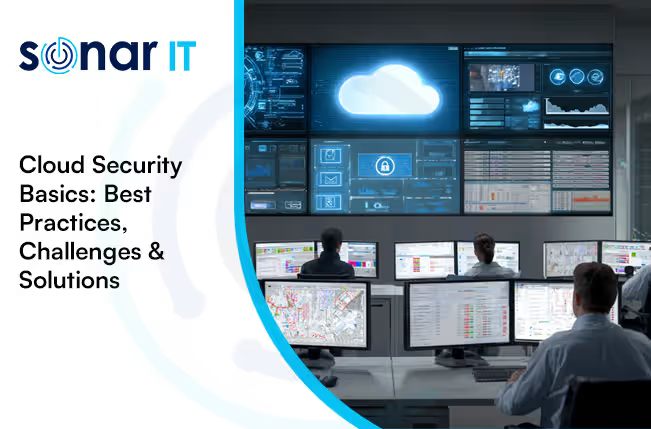3 Key Differences Between Business Continuity and Disaster Recovery
Understanding the 3 Main Differences Between Business Continuity and Disaster Recovery
Disasters can take many forms-a natural disasters like a tornado or hurricanes, manufactured disasters such as terrorist attacks, or even technical outages. But whatever the cause, the damage and destruction they leave in their wake can devastate businesses.
That's why it's so essential for companies to have a disaster recovery plan in place. A good disaster recovery plan will help you get your business back up and running quickly after a disaster. But what is business continuity, and how is it different from disaster recovery? In this article, Sonar IT, the major provider of managed IT services in London, will explain the three key differences between business continuity and disaster recovery.
What Is Business Continuity And What Is Disaster Recovery
Business continuity is planning for potential disruptions to your business. It is a proactive approach to identifying risks and putting in place measures to ensure that your business can continue functioning as usual, regardless of any unexpected events or circumstances. It is a proactive way of managing your business in adversity.
Disaster recovery, on the other hand, is a reactive approach to dealing with disasters. It focuses on restoring operations and recovering data after an incident has occurred. In most cases, disaster recovery will involve getting systems back up and running as quickly as possible while ensuring that any critical data is recovered.
The Three Key Differences Between Business Continuity And Disaster Recovery
When it comes to business continuity vs. disaster recovery, there are three main differences: when the plan takes effect and what processes it focuses on. The resources you will need to make sure your method is effective.
- Timing: Timing is the main difference between business continuity and disaster recovery. Business continuity plans are usually implemented before an incident occurs, while disaster recovery plans are typically implemented afterward.
- Processes: Another difference is the processes involved. Business continuity focuses on preventing disruption first, while disaster recovery seeks to restore operations as quickly as possible after a disturbance has occurred.
- Resources: Finally, there is a difference in terms of resources needed for each plan. Business continuity requires more resources upfront since it involves actively identifying risks and putting measures in place to mitigate them; however, Disaster Recovery plans require fewer resources initially since they involve restoring systems after an incident.
Where Do Business Continuity and Disaster Recovery Overlap
When it comes to business continuity and disaster recovery, there are several areas where the two overlap. One of these is data backup, a critical component of business continuity and disaster recovery plans. Backing up your data regularly allows you to quickly restore any lost or corrupted files after an incident occurs.
For example, with business continuity in place, you can quickly restore the data backed up when a business suffers a disaster or disruption. It makes getting back up and running easier without missing a beat. But, if the business continuity plan had not been in place, a disaster recovery plan would have been needed to get the business back up and running. It could involve restoring files from an external source, such as another server or tape backups.
Another area where business continuity and disaster recovery overlap is in execution. When disasters occur, it is essential to plan how the organization will respond. It includes having procedures and resources ready to go before an incident occurs. Both business continuity and disaster recovery plans can be used to ensure that your organization is prepared for any eventuality.
Business Continuity vs. Disaster Recovery - Which One is More Suitable For Your Business
Having understood the differences and the areas of overlap between business continuity and disaster recovery, the next step is to decide which would be more suitable for your business. It depends on the size of your organization, the type of data you are dealing with, and other factors, such as potential risks or threats.
Investing in business continuity and disaster recovery plans is advisable if you have a larger organization dealing with sensitive data. This way, you can be sure that your operations will continue without disruption if something unexpected happens. However, a single plan with smaller organizations may be sufficient since fewer resources and more periodic data are available to protect.
No matter what size or type of organization you run, having a plan is essential for mitigating risks and ensuring that your operations run smoothly. By understanding the differences between business continuity and disaster recovery plans, you can decide which is best for your organization.
The importance of business continuity and disaster recovery plans in place cannot be overstated. While both plans involve some upfront costs, they are essential to protecting your organization from unexpected disruptions or disasters. With the right strategy in place, you can ensure that your operations will continue to run smoothly despite any incident. These plans will provide peace of mind and help you avoid costly disruptions. So, it's essential to consider investing in business continuity and disaster recovery as soon as possible. It will ensure that you have a reliable backup plan should anything go wrong and give you the best chance of minimizing losses due to a disruption or disaster. Ultimately, this helps make sure that your business operations remain on track no matter what happens.
Final Thoughts
Remember, when it comes to business continuity and disaster recovery, the best plan is the one that works for you and meets your exact needs. It's essential to take time to evaluate all of your options before deciding so that you can make sure that your organization will be prepared if an incident occurs. With a detailed plan, you can have peace of mind knowing that you are ready for any eventuality. Taking the time to assess your specific requirements now correctly can help ensure that your organization remains safe and secure in the future. So don't wait - start planning today! If you want to learn more about how Sonar IT is the leading provider of managed IT services in London, check out our website. We can provide the support you need to ensure your business continuity and disaster recovery plans are up-to-date and well-executed. Contact Sonar IT today for more information!
.svg)
%2520(1).avif)





